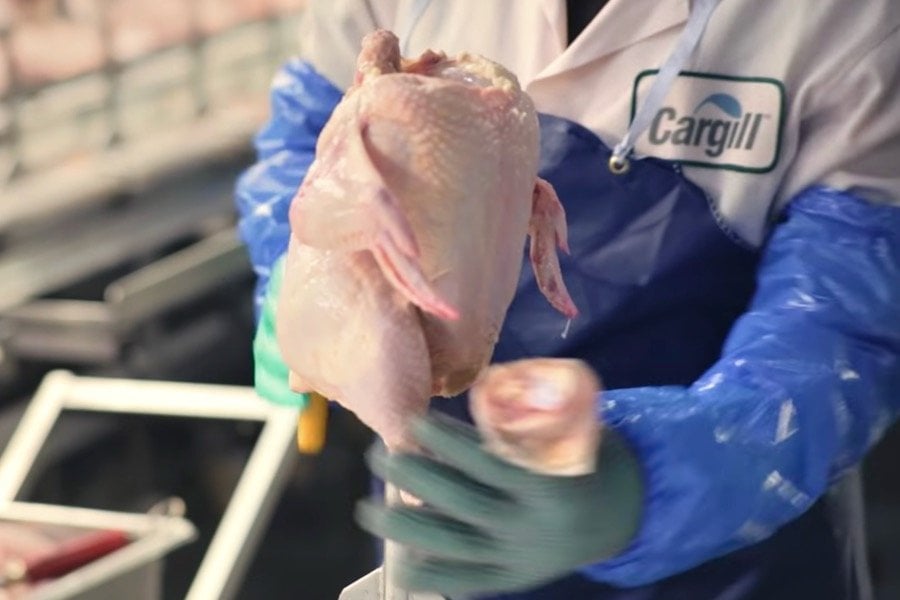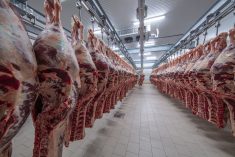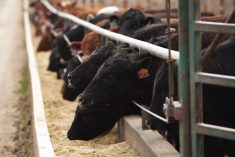Agrifood firm Cargill is seeking slaughter space for Ontario chickens at other processors after temporarily closing its London poultry packing plant Tuesday against an outbreak of COVID-19 among workers.
The company said Tuesday it was “taking this step out of an abundance of caution as our local workforce deals with the community-wide impacts of COVID-19.”
CBC on Tuesday quoted a company representative as saying 82 active cases involve employees at the London plant, which reported a handful of cases a couple of weeks earlier.
According to Cargill, the plant employs about 900 people and has capacity to process about 100,000 southwestern Ontario chickens per day.
Read Also

B.C. ostriches culled, CFIA confirms
Ostriches on an embattled Edgewood, B.C. farm have been culled after a prolonged legal battle, the Canadian Food Inspection Agency has confirmed.
“This was a difficult decision for our team who are operating an essential service and are committed to delivering food for families across Canada and ensuring the resilience of our supply chain,” plant general manager Derek Hill said Tuesday in a release. “But ultimately, our employees’ safety and well-being come first.”
Cargill said it’s “working closely” with the Middlesex-London Health Unit and other public health officials to “ensure appropriate prevention, testing and cleaning in our facilities and that employees are following quarantine protocols at home.”
The company didn’t say how long it expects the plant to be offline, but a company spokesperson said via email that workers had processed all birds at the plant and Cargill is “working to send birds to other processors in the area.”
A representative for Chicken Farmers of Ontario wasn’t immediately available for comment Wednesday.
However, CFO on Monday announced it has set up a new emergency cull policy in the event of an “extended” decline in processing capacity.
CFO said its board, working with industry stakeholders and the Association of Ontario Chicken Processors (AOCP), had developed a COVID-19 emergency euthanasia policy and COVID-19 emergency euthanasia fund regulation.
The policy was drafted so as to “mitigate risks to farmer-members and industry in periods of potential extended plant shutdown or substantial impairment of chicken processing capability.”
“This is a measure of last resort and will never be an immediate response,” CFO chair Ed Benjamins said in Monday’s release. “The entire industry is committed to working tirelessly to avoid this measure when possible.”
CFO interim CEO Mike Nailor said the plan “will provide farmer-members with support in the event that birds cannot be processed as a result of COVID-19 and all other contingency planning options have been exhausted.”
CFO didn’t name any specific processor in its release, but said the COVID-19 pandemic “continues to impact the availability of labour in many sectors, and Ontario chicken processors are no exception.”
Some processors, CFO said, were seeing “increased labour absentee rates” that are “adversely impacting processing capability.”
As for the plant’s workforce, Cargill said Tuesday that employees will receive a weekly guarantee of 36 hours of pay.
The company emphasized it has made testing available to all its employees and is “reinforcing the importance of adhering to provincial stay-at-home orders.”
Cargill said it had encouraged any employees who were sick or exposed to anyone with COVID-19 in the last 14 days to stay home, and had offered up to 80 hours of additional paid leave related to COVID-19.
In the plant, measures such as temperature testing, “enhanced” cleaning and sanitizing, face coverings, screening between work stations, prohibiting visitors, social distancing where possible, staggered breaks and reducing carpooling “have been in place for months and will remain in place when we resume full operations.”
The London shutdown is not Cargill’s first COVID-related work stoppage in Canada. The company’s major beef slaughter plant at High River, Alta. was idled temporarily last April after an outbreak that infected hundreds of workers and killed two.
The company’s other major Canadian beef slaughter plant, at Guelph, Ont., was shut for almost two weeks last December following an outbreak infecting dozens of employees. — Glacier FarmMedia Network















